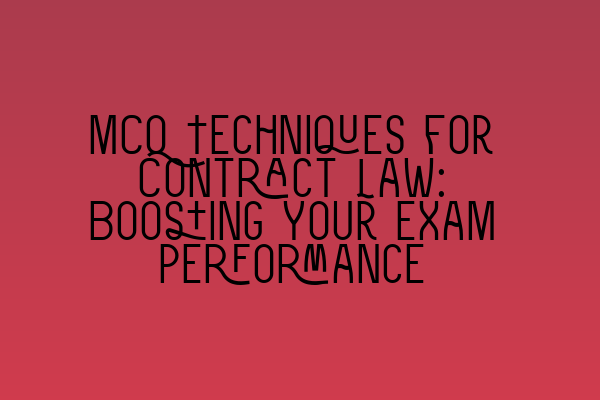MCQ Techniques for Contract Law: Boosting Your Exam Performance
Contract law is a fundamental area of study for aspiring solicitors, and mastering the subject is essential for success in your exams. Multiple choice questions (MCQs) are a common format used in contract law exams, and being able to effectively tackle them can significantly improve your performance. In this blog post, we will explore some key techniques that can help you boost your exam performance and navigate through contract law MCQs with confidence.
1. Understand the Question
The first step in answering any MCQ is to thoroughly understand the question. Read it carefully, paying close attention to any important details or keywords. Look for specific terms, such as “offer,” “acceptance,” or “consideration,” which can provide clues to the correct answer. Make sure you fully comprehend what the question is asking before proceeding.
2. Analyze all Options
Next, carefully analyze all the options provided. Even if you think you know the correct answer right away, take the time to read through all the choices. It’s not uncommon for the examiners to include plausible distractors that can confuse you. By analyzing all the options, you can eliminate the incorrect answers and narrow down your choices.
3. Apply Legal Principles
Contract law is based on a set of legal principles. Familiarize yourself with these principles and apply them to the given scenario. Look for key facts that align with these principles to identify the correct answer. Remember, contract law is not only about memorizing cases and statutes but also about understanding the underlying principles and applying them to different situations.
4. Use Process of Elimination
If you are unsure about the correct answer, utilize the process of elimination. Start by eliminating the choices that are clearly incorrect. Focus on the remaining options and consider the nuances of each one. Look for any logical inconsistencies or contradictory statements that can help you identify the correct answer. By eliminating the wrong choices, you increase your chances of selecting the right one.
5. Time Management
Effective time management is crucial during an exam. MCQs are often time-limited, so practice managing your time efficiently. Allocate a certain amount of time for each question and stick to it. If you encounter a particularly challenging question, move on and come back to it later if you have time. By managing your time effectively, you’ll be able to tackle all the questions within the allotted time.
6. Practice, Practice, Practice
Like any skill, MCQ technique improves with practice. Familiarize yourself with the format and types of questions commonly asked in contract law exams. Practice solving a variety of MCQs from past papers and review the explanations for both correct and incorrect answers. This practice will help you become more comfortable with the format and identify any areas where you need improvement.
In conclusion, mastering MCQ techniques is essential for performing well in contract law exams. By understanding the question, analyzing all options, applying legal principles, using the process of elimination, managing your time effectively, and practicing regularly, you can boost your exam performance and increase your chances of success.
Continue to expand your knowledge with related articles:
– Navigating Legal Challenges and Pitfalls in Your Practice
– Ethical Responsibilities of Solicitors: Upholding Professionalism
– Barrister vs. Solicitor: A Comprehensive Comparison
– Understanding the SRA Competence Statement: A Guide for Solicitors
– Networking for Solicitors: Strategies for Building a Strong Network
Remember, these related articles can provide valuable insights into various aspects of being a successful solicitor. Building a strong foundation in contract law and staying informed about ethical responsibilities, legal challenges, and networking strategies will contribute to your overall professional development.
So, embrace these MCQ techniques, seize the opportunity to practice, and approach your contract law exams with confidence. Best of luck!
